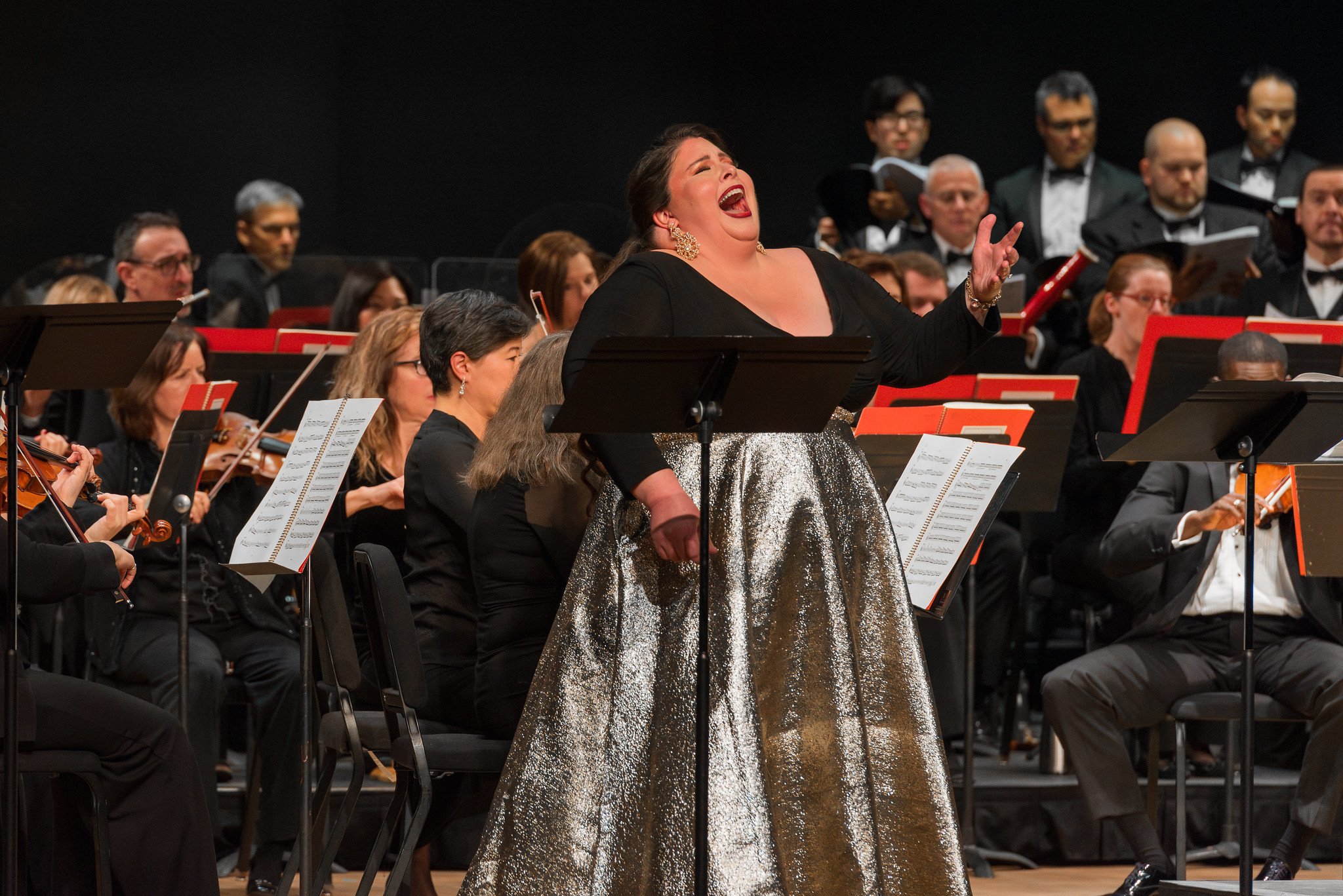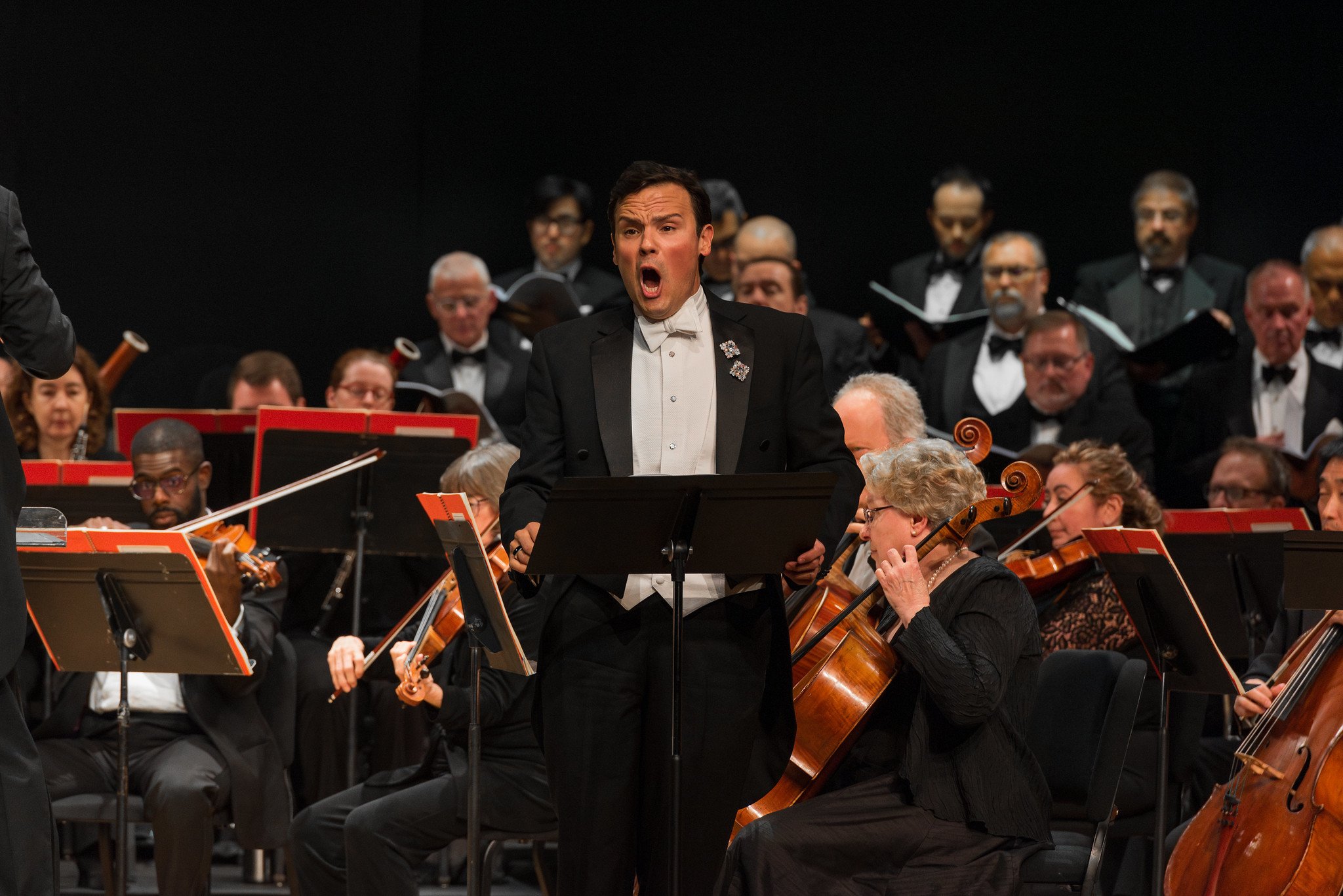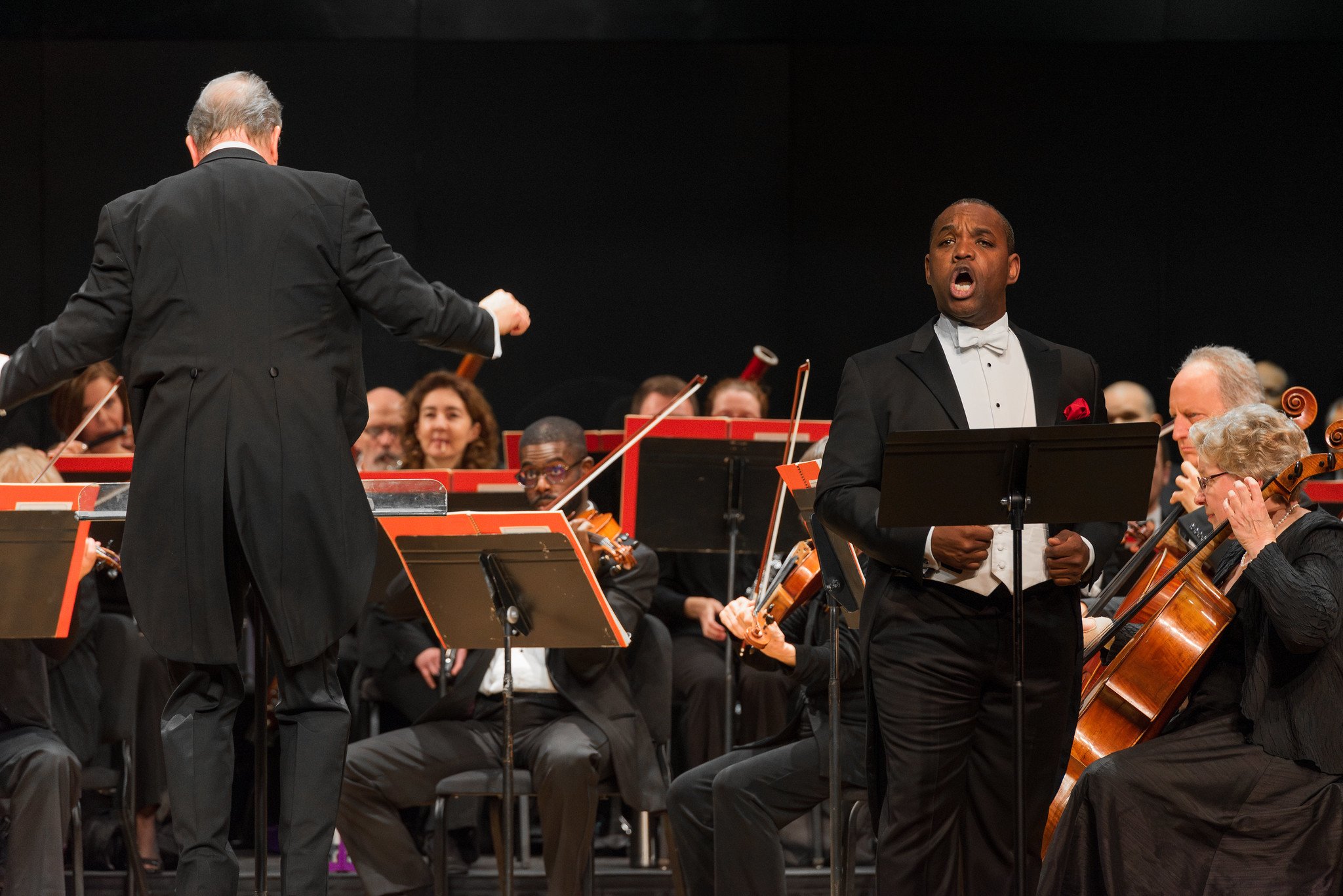Washington Concert Opera presented the rarely performed Rossini opera, Ermione, Saturday evening in Lisner Auditorium on the GW campus. With a cast headlined by Metropolitan Opera veterans Angela Meade, David Portillo, Lawrence Brownlee, and Ginger Costa-Jackson with Conductor Antony Walker, I was expecting a good show or maybe just an interesting evening; however, after Ms. Costa-Jackson sang Andromacha’s opening aria with such passion as a woman fearful for her son and crushed by the loss of her husband, all resistance to this opera vanished. The other singers must have realized at that point that they needed to bring their A-game to match up with her, and they did! Each of the principal singers elicited explosions of applause from the audience time and again for their various arias, one wow moment after another. This was the most fun at the opera that I have had in a long time.
Angela Meade as Ermione with Conductor Antony Walker; the Washington Concert Opera Orchestra and Chorus in the background. Production photo by Caitlin Oldham; courtesy of Washington Concert Opera.
I wish Gioachino Rossini himself could have been there. To say that Ermione failed to impress when it premiered in 1819 can hardly be overstated; it closed after seven performances and the opera was not staged again for one hundred and fifty years. Even in modern times, it has been produced worldwide only six times in the last ten years. Rossini moved on, but evidently kept it in his heart, referring to it in his later years as his “little William Tell”. Many reasons have been proffered for its lack of popularity – it was too avant-garde, seen as an effort of Rossini to break free from the Italian operatic conventions of his day. The infrequency of its productions today may be a combination of cost – a large cast with four extraordinary singers is needed – and the limited popular appeal of Greek tragedy today, especially one with such a complicated, dark storyline, devoid of comic relief and lacking superheroes…lacking any kind of hero, for that matter.
l to r: Ginger Costa-Jackson as Andromacha, Angela Meade as Ermione, David Portillo as Pirro, and Lawrence Brownlee as Oreste, with Conductor Antony Walker on the platform and in the background the WCO Orchestra and Chorus. Production photo by Caitlin Oldham; courtesy of Washington Concert Opera.
The librettist for Ermione was Andrea Leone Tottola; he adapted the story from Jean Racine’s play, Andromaque. The time is shortly after the Trojan War, with Trojan prisoners held in Epirus, where King Pirro has placed Astianatte, the son of slain Trojan hero, Hector, in prison; his wife Andromacha is allowed to move about under the protection of King Pirro, who has fallen in love with her. Noble woman Ermione has learned of his affection for Andromacha and feels jilted and betrayed. Oreste, son of Agamemnon arrives as an emissary who wants Hector’s son put to death out of Greek fear he could lead a new Trojan uprising. Oreste is deeply in love with Ermione, who has no interest in him. The women control the guys with Andromacha wanting to save her son and Ermione wanting Pirro back. Ermione goes too far, asking Oreste to kill Pirro to get her hand, and then wishing the Furies on him for carrying out her request. It ends with the Greeks protecting Oreste by escorting him back to Greece by sea. Epirus is left in turmoil, with the stories of Ermione and Andromacha left unfinished, and no season 2 planned. If Rossini had employed supernatural Furies and had them do some earlier dirty work, it might have played better for modern American audiences. Ah, what might have been.
l to r: Kate Jackman as Cefisa, Ginger Costa-Jackson as Andromacha, Erin Ridge as Cleone, and Angela Meade as Ermione, Production photo by Caitlin Oldham; courtesy of Washington Concert Opera.
The outstanding soprano Angela Meade, who portrays Ermione, has appeared in several productions of Ermione over the last ten years, and her performances have been influential in the renewed interest it has received. In her opening comments, Executive Director Meg Sippey cautioned that Ms. Meade was recovering from a respiratory infection and while fine she might need to cough on stage; she never did, and if this was Ms. Meade at less than her best, please let me experience her best at a future performance. This is a difficult role, especially in Act 2 when Ermione moves through one emotion to another, from jealous anger to guilt to love to grief to fury, all decorated with melisma and trills in high and low registers. Despite the caution, her virtuosity and beautiful tone did not disappoint, and I was on my feet with everyone else applauding at the end. Tenor David Portillo as Pirro was a marvel, singing beautifully with a silvery tone while being pushed back and forth in different directions by Ermione and Andromacha. He managed some portions requiring rapid fire delivery with his beautiful tone completely in tack. Tenor Lawrence Brownlee is a treasure and brought his A-game as well playing the love struck, one dimensional Oreste, also requiring some vocal pyrotechnics in a higher range, something he is known for. Mezzo-soprano Ginger Costa-Jackson as Andromacha was so good and so emotionally expressive I suspected she was channeling Maria Callas on her 100th birthdate (Dec 2, 1923). She was quite good in a previous appearance with WCO, but she is now performing on an even higher, more accomplished level. The performance was further embellished by a perfectly cast group of soloists familiar to Washington area audiences, which included bass-baritone Matthew Scollin as Pirro’s tutor Fenicio, Kate Jackman as Andromac’s confidant Cefisa, tenor Rolando Sanz as Pirro’s confidant Attalo, soprano Erin Ridge as Ermione’s friend Cleone, and tenor Matthew Hill as Oreste’s friend Pilade.
David Portillo as Pirro, Lawrence Brownlee as Oreste, Matthew Hill as Pilade, Rolando Sanz as Attalo, and Matthew Scollin as Fenicio. Production photo by Caitlin Oldham; courtesy of Washington Concert Opera.
Ok, the vocals are great; what about Rossini’s music that so few people have heard? Well, it is Rossini, always enjoyable to listen to but not always dramatically in sync with the drama, but in Ermione, it mostly is. The great composer in breaking free of the typical opera seria format of his day, had the chorus chime in during the overture; the overture sounds like a celebration with a great crescendo at the end, but the chorus sings as Trojans bemoaning their loss of the war. I suppose the point was to contrast what the citizens of Epirus were feeling versus the Trojans? Staging might have helped this point, though it evidently did not for Italians in the day. A few times, I had the feeling the music I was enjoying was for a different opera (my wife disagrees), but think of it as two for one. I read that this opera by Rossini was more in the style of middle Verdi than early 1800s. Perhaps, but I have trouble imagining Verdi writing that overture and some of the happy time music supporting a Greek tragedy. Rossini also broke from convention in having his arias join with the next step in the story and even join with other singers. Actually, there were some great duets! Rossini also chose to portray a strong, domineering woman dominating supposedly great men. Evidently, these innovations were off putting to the first Italian audiences. Rossini was a bel canto master and wrote this opera for some great singers who could make the vocals shine. Washington Concert Opera took on that challenge and met it with flying colors.
Angela Meade as Ermione and David Portillo as Pirro. Production photos by Caitlin Oldham; courtesy of Washington Concert Opera.
Washington Concert Orchestra led by Artistic Director and Conductor Walker got off to a slow start for me but quickly built to their usual mastery. It took a lot of effort to stay in sync with these singers singing this great music; I wish I had a recording of Mr. Brownlee’s interplay with the orchestra, a treat that I will long remember. The WCO Chorus under the direction of Assistant Conductor and Concert Master David Hanlon made the evening more enjoyable, with the men’s section doing most of the heavy lifting in this one. The finale for Act 1 was thrilling, with all the vocalists and orchestra and chorus participating in the bedlam that had developed. No staging was used for the performance of this opera, but the singers in character and the music told the story eloquently with great feeling.
Lawrence Brownlee as Oreste and Ginger Costa-Jackson as Andromacha. Production photo by Caitlin Oldham; courtesy of Washington Concert Opera.
If you have the opportunity to see Ermione, I strongly recommend you go, especially if you think the singers can handle it. Going to see Washington Concert Opera performances is simply something you should put on your calendar.
The Fan Experience: Washington Concert Opera opened their 2023-2024 season with the performance of Ermione on December 2 in George Washington’s Lisner Auditorium. The opera was sung in Italian with English surtitles on a screen overhead. This performance was on Saturday, but WCO performances are more typically on Sunday evening, as will be their April 7 performance of La Rondine featuring soprano Ailyn Pèrez in her first appearance with WCO.
Peter Russell, General Director of Vocal Arts DC, presented a pre-opera talk and provided program notes. Mr. Russell also presents a one-hour lecture on each production in the free Opera Gems Online series. His lectures are impressively detailed and informative, with samples of the music to be heard.
In my experience, all the seats in Lisner Auditorium are fine for viewing the performance, but the sound is probably better towards the center of the auditorium. Parking on the street around the auditorium is catch as catch can; be sure to read the signs! Metro is two blocks away. WCO has a visitor web page with directions and parking info, helpful in finding nearby parking lots.








